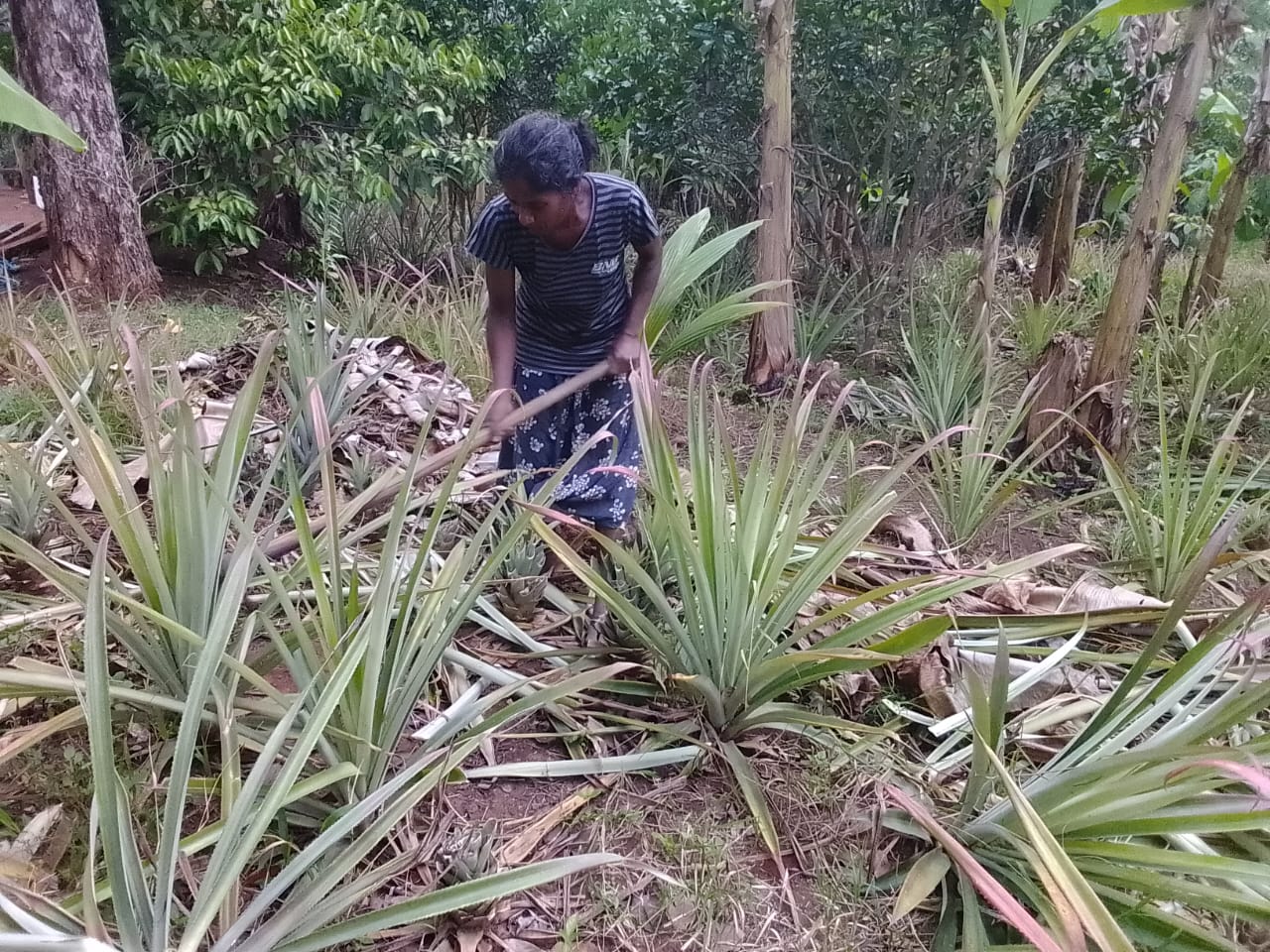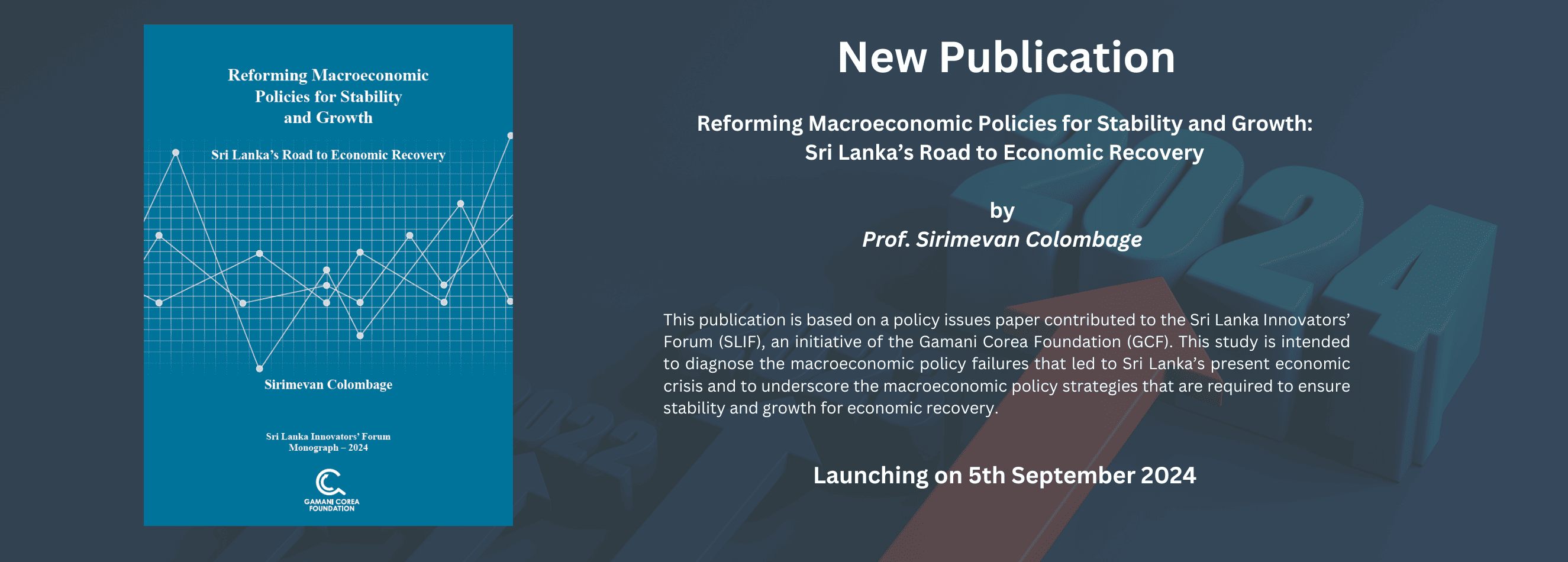
Sri Lanka’s Economic Development Prospects
The policy dilemmas facing Sri Lanka in fostering economic development in the context of economic recovery were focused at a recent national consultation symposium on inclusive development organized by the National Science Foundation. The discussion was based on the paper, “Sri Lanka’s Economic Recovery and Inclusive Development: Prospects and Challenges”, presented by an expert panel led by Prof. Sirimevan Colombage. The objective of this study was to diagnose the policy gaps and present actionable recommendations. Inclusive development, defined as economic development that creates opportunities for all segments of the population and distributes the dividends of increased prosperity fairly across the society, was central to the analysis.
Currently, Sri Lanka is undergoing a severe economic crisis with multiple setbacks, including negative GDP growth, twin deficits in fiscal operations and the current account of the balance of payments, and foreign exchange shortage. Sri Lanka became a debt-default country for the first time in its history in April 2022.
As a result of the economic crisis, 20 percent of small and medium enterprises, which contribute around 50 percent to the country’s GDP, have been closed down since 2019. Around 60 percent of households reported losses in their income. The population living below the poverty line more than doubled from 11.3 percent in 2019 to 25.9 percent and youth unemployment increased 17 percent in 2023. Health, food security, and education deteriorated in recent years.
The study proposes a comprehensive policy framework to achieve the final goals of economic recovery and inclusive development through the intermediate goals of
(a) Economic stability and debt restructuring.
(b) Economic growth and job creation.
(c) Poverty reduction and equity.
(d) Environmental sustainability. The policy strategies required to achieve the envisaged goals include macroeconomic policies, structural reforms, governance and anti-corruption, social service policies, inclusive innovation, and environmental policies.
The study emphasizes the need for unwavering political commitment to pursue economic reforms, ensuring the inclusive development process.
GCF’s Competitive Grant Scheme Fills Gaps in Policy-oriented Economic Research
Economic research for development focuses on understanding the economic conditions, policies, and strategies that can promote sustainable development of a country. Evidence-based research provides the necessary knowledge base and tools to design effective policies, allocate resources efficiently, monitor progress, and ensure that development benefits all segments of society, fostering inclusive development.
As a developing country, economic research is crucial for Sri Lanka to better navigate its development journey, identifying its strengths and addressing its weaknesses to achieve long-term prosperity and stability. In Sri Lanka, however, there is severe dearth of in-depth research in the field of economics, constraining the space for rule-based policymaking.
There are 18, 858 publications across different fields of study in Sri Lanka from 2019 to the present. However, only 372 were in economics, econometrics, and finance which means that just about 2% of the total publications were in these areas (Source: Scopus, Accessed on July 11, 2024).
The availability of funds to conduct thorough and impactful studies is a crucial objective in strengthening the economic research capacity.
The trends in publications in the areas of economics, econometrics and finance are illustrated in the graph below.

Source: Scopus, Accessed on July 11, 2024
The Gamani Corea Foundation (GCF) launched the GCF Competitive Research Awards Scheme in April 2024 to promote policy-oriented economic research in Sri Lanka. This initiative aims to provide the necessary support for in-depth studies and analysis that can drive informed policy-making and strategic development.
In order to promote research and peer-reviewed publications in the field of economics, research proposals were invited from researchers across the country under GCF research awards 2024-2025. , These research proposals have been assigned for evaluation by independent experts in the field. Grants will be awarded to the most promising research projects.
SPOTLIGHT
ජීවිතය ජය ගන්නට වෙර දරන
පද්ම ලතා
එම්. ජී. පත්ම ලතා මොණරාගල දිස්ත්රිකයේ අතිදුෂ්කර ගම්මානයක් වන බිබිල තිත්තවැල් කිවුල ග්රාමය නිජබිම කැර ගත් දිරිය කාන්තාවකි. දරිද්රතාවය හා දුෂ්කරතා උපතින්ම රැගෙන ආ පද්ම ලතා, තම ජීවිකාව ගොඩනඟා ගැනීමට මහා පොළෙව සමඟ පෙර බදින අන්දම දුටුවන්ගේ සිත් කම්පා කරවන සිද්ධියකි.
සිය සැමියා, පත්ම ලතා ව හැර යෑමත් සමඟ ජිවිතය වටා අභියෝග රැසක් මතු විය. දෑස් ආබාධිත වැඩිමහල් දියණිය රැක බලා ගැනීමත්, පාසල් යන දෙවැනි දියණියට හොඳ වටාපිටාවක් සකසා දීමටත් වියපත් මව පෝෂණය කිරීමටත් හැකි මාර්ග ගැන ඇය නිරන්තරයෙන් අවදානය යෙමු කෙළේය. ස්ථිර ආදායම් මාර්ගයක් සකසා ගැනීමට ඇයට තිබු එකම මඟ මහා පොළව ගැන තිබු විශ්වාසය පමණී.අවසානයේ කැත්ත , උදැල්ල අතට ගෙන මහා පොළවත් සමඟ පොරබදින්නට ඇය තීරණය කෙළේ කුසගින්න ඉවසා ගැනීමට නොහැකි විටය.
අව්ව , වැස්ස සියල්ල ම ආශිර්වාදයක් කැර ගනිමින් පද්ම ලතා තමන්ට අයත් එකම ඉඩම් කැබැල්ලේ වගා කටයුතු ආරම්භ කරමින්, සිය ආර්ථිකයට ශක්තියත් අත්කැර ගන්නට වෑයම් දැරීය. ඒ වන විට ප්රාද්ශයේ, ප්රාදේශීය ලේකම් කාර්යාලය ආරම්භ කැර තිබු වගා ආධාර ව්යාපෘති වැඩ සටහනට සම්බන්ධ වූ පත්ම ලතා, අන්නාසි වගා ව්යාපෘතියක් ආරම්භ කිරීමට ආධාර පැතීය. එම ආධාරයෙන් සිය අන්නාසි වගාව ආරම්භ කළ ඇය, එයින් යම් තරමක් දුරට තම පවුලේ ආර්ථිකය සවිමත් කැර ගන්නට මගක් පදා ගත්තාය. ප්රාදේශීය ලේකම් කාර්යාලයෙන්, ලැබුණු උපදෙස් අකුරටම පිළිපැද්ද පත්ම ලතා, සිය කාලය, ග්රමය අන්නාසි වගාව වෙනුවෙන් ම කැප කෙළේය.
මේ වන විට අක්කරයකට ආසන්න ප්රමාණයක් අන්නාසි වගාව කැර ඇති පද්ම ලතා , වාර්ෂික කන්නයෙන් කිලෝ 1500–2500 අතර ප්රමාණයක් වෙළෙඳ පොළ වෙත යෑවීමට අද සමත් වී ඇත. ඊට අමතරව අන්නාසි අස්වැන්න පෞද්ගලික ආයතනයකට අලෙවි කිරිමට ද අද ඇය සමත් වී ඇත . ඇතැම් අවස්ථාවලදී මෙයට වඩා වැඩි අස්වැන්නක් නෙලා ගැනීමට සමත් වන ඇය, බිබිල වෙළෙඳ පොළ තුළ සිය සැපයූම් අධිකාරිය ගොඩනඟා ගැනීමට සමත් වී ඇත්තේ අන්නාසි වගාව සිය ජිවිකාව කැර ගත් නිසාය.
එසේම, මෑත කාලයේ ඇය තවත් වගා ව්යාපෘතියකට අත ගසා ඇත. පෞද්ගලික ආයතනයක් ආරම්භ කැර ඇති ‘ නයි මිරිස් වගා ’ ව්යාපෘතිය හා සම්බන්ධ වන පත්ම ලතා අන්නාසි වගාවට සමාන්තරව මෙම වගාව ද (නයි මිරිස් වගා) සිදු කැර ගෙන යයි. ස්වභාවික පරිසරයෙන් ලැබෙන කාබනික පොහොර මනා ලෙස යොදා ගනිමින් ඇය සිය වගා කටයුතු සිදු කැර ගෙන යන්නේ කාටත් ආදර්ශයක් සපයමිනි. ඇය සිය වගා කටයුතුවලට විවිධ කෘමි නාශක ප්රමිතියෙන් යුතුව සකසා භාවිතාවට ගනු ලබන්නේ ලැබුණු උපදෙස් සැලකිල්ලට ගනිමිනි. අවසානයේ නොලා ගන්නා අස්වැන්න සිය දෑතින්ම ඔසවා ගෙන වෙළෙඳ පොළට ගෙන යන්නේ පද්ම ලතා ම වීම විශේෂත්වයකි. පද්ම ලතා කිසිදු බිම් අගලක් අපතේ යෑමට ඉඩ නොදී දෛනික අවශ්යවයන් සපුරා ගැනීමට අවශ්ය වන විවිධ එළවළු වර්ග ක්රමානකුලව වගා කිරීමට අද පටන් ගෙන තිබේ. තවත් පැත්තකින් තම ගම් පියසේ සිටින ආර්ථික අපහසුතාවලින් මිරීකී සිටින කාන්තාවන්ට සාර්ථක වගා ව්යාපෘතියක් කැර ගෙන යන්නේ කෙසේද යන්න පිළිබඳව පුහුණුව ලබා දෙන , කුඩා වගා බිමි ව්යවසායිකාවක් මෙන්ම දක්ෂ ගෙවිලියක්ද වී ඇත.
සටහන-.
ගයානි අසිංසලා පියදිගම
ඌව පළාත
බිබිල
(මෙම ලිපියේ අන්තර්ගත කරුණු සම්බන්දයෙන් සම්පූර්ණ වගකීම රචකයා සතුවන අතර, ඊට ගමණී කොරෙයා පදනම වගකියනු නොලැබේ.)
Pathmalatha Overcomes Poverty.
This month’s spotlight falls on Pathmalatha. from Bibile in the UVA province whose journey to success is an inspiration to all afflicted with poverty. She has only a piece of land to call her own which she decided to use to generate an income to support her two daughters. and ailing mother.
She started with a small scale pineapple plantation with help from provincial secretariat and has now diversified her cultivation using natural fertilizer and pest control techniques she has developed herself. That’s not all. She has now reached a stage where she is imparting her knowledge to other poverty stricken women in her village and helping them to overcome poverty.

Launching of GCF-SLIF Monograph on Macroeconomic Policies
The first monograph of the GCF’s Sri Lanka Innovators’ Forum (SLIF) titled “Reforming Macroeconomic Policies for Stability and Growth: Sri Lanka’s Road to Economic Recovery” will be launched at the Light House Auditorium, Horton Place, Colombo 7 on 5th September 2024. The book, authored by Prof. Sirimevan Colombage, is intended to diagnose the macroeconomic policy failures that led to Sri Lanka’s present economic crisis and to underscore the macroeconomic policy strategies that are required to ensure stability and growth for economic recovery.
Although the economy was liberalized far ahead of other South Asian nations, Sri Lanka has missed the opportunity to forge ahead with export-led growth due to factors such as weak governance, institutional failures, and widespread corruption, exacerbating the economic setback.

In March 2023, the Government undertook a rigorous policy reform package under a 4-year Extended Fund Facility (EFF) with the International Monetary Fund (IMF).
The author emphasizes that against the backdrop of the current economic crisis, Sri Lanka cannot afford another stop-go cycle of reforms that experiment with alternative policy strategies in the years ahead. Hence, political commitment is essential to continue the policy reforms to achieve economic growth and stability in tandem with debt restructuring.
It is expected that the monograph will be of use to policymakers, researchers, academics, and the public.
Nishanthan Shobana, from the Northern Province is our feature for the month
